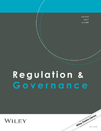Dysfunctional state institutions, trust, and governance in areas of limited statehood
Tanja A. Börzel, Thomas Risse – 2015
Areas of limited statehood where the state is absent or dysfunctional are rarely ungoverned or ungovernable spaces. The provision of rules and regulations, as well as of public goods and services – governance – does not necessarily depend on the existence of functioning state institutions. How can this be explained? To begin with, we identify functional equivalents to state institutions that fail to govern hierarchically. Moreover, we focus on informal institutions based on trust that are endogenous to areas of limited statehood. Personalized trust among community members enables actors to overcome collective action problems and enhances the legitimacy of governance actors. The main challenge in areas of limited statehood, which are often characterized by social heterogeneity and deep social and cultural cleavages (particularly in post-conflict societies) is to move to generalized trust beyond the local level and to “imagined communities among strangers,” despite dysfunctional state institutions. We propose two mechanisms: First, the more group-based identities are constructed in inclusive ways and the more group identities are cross-cutting and overlapping, the more they lead to and maintain generalized trust. Second, experiences with fair and impartial institutions and governance practices – irrespective of whether state or non-state – also lead to generalized trust beyond the local level and allow for the upscaling of governance.

